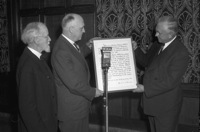
On January 13th, 1922, station 9XM became WHA. It was clear to WHA’s first program directors, William Lighty and Harold McCarty, that radio represented a powerful opportunity to promote “understanding, freedom, and service” through “air power” (McCarty, Box 49). Radio held the capacity, they believed, to cultivate a ‘love of nature, the joy of music, the pleasure of reading, a knowledge of science, the satisfaction of artistic expression, a sympathetic interest in others’. If programming could accentuate these characteristics then progressive democratic ideals would be available not only to those fortunate enough to attend the university, but to all citizens of the state.
A mission statement from 1933 lists WHA’s programming goals (Bennett, “Wisconsin’s Struggle“):
1. To serve agricultural interests of the state by furnishing technical and market information.
2. To serve households of the state by furnishing technical counsel on matters of health and conduct.
3. To serve public schools of the state by supplementing educational methods and materials.
4. To serve public interests and public enterprise by providing them with radio facilities as good as commercial.
5. To serve interests of an informed public opinion by providing a state wide forum for the pro and con type discussion of labor.
Indeed the station became immensely popular, though not without some backlash from rural listeners (for more on this topic see Vaillant). Programming included everything from homemaking to geography to ‘character training’ to broadcasts on taxation policy to University of Wisconsin sports coverage. The station was so successful that WIBA‘s Badger Broadcasting, owned by William Evjue, petitioned the FCC to usurp WHA’s broadcast frequency in the summer of 1933 for private use, offering to provide WHA with ‘free time’ as a consolation. For a few months the station seemed in real jeopardy because of Evjue’s personal relationship with the LaFollette brothers, who were governor and a senator of the state respectively. After a maelstrom of letters and public outcry WIBA’s bid failed, and WHA went on to become the most prolific, successful, and well-developed model of educational radio in broadcasting history. This section features biographies on the ‘Early Years’ program directors: Harold McCarty and William Lighty. The WHS archives hold tens of thousands of documents from this era, especially from 1931 on.
Digital Documents
